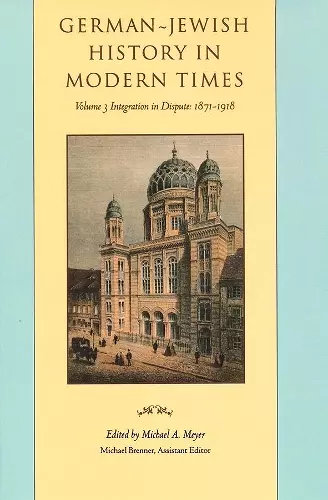German-Jewish History in Modern Times
Integration and Dispute, 1871-1918
Michael Brenner author Michael Meyer editor Michael Brenner editor
Format:Hardback
Publisher:Columbia University Press
Published:12th Jan '98
Currently unavailable, and unfortunately no date known when it will be back

This four-volume collective project by a team of leading scholars offers a vivid portrait of Jewish history in German-speaking countries over nearly four centuries. This series is sponsored by the Leo Baeck Institute, established in 1955 in Jerusalem, London, and New York for the purpose of advancing scholarship on the Jews in German-speaking lands.
A comprehensive historical survey of the Jewish presence in Central Europe from the seventeenth century to the Holocaust, German-Jewish History in Modern Times is a four-volume collective project by a team of leading scholars, offering a vivid portrait of Jewish History. The series is sponsored by the Leo Baeck Institute, established in 1955 in Jerusalem, London, and New York for the purpose of advancing scholarship on the Jews in German-speaking lands. Emancipation and Acculturation: 1780-1871, the second of four volumes, focuses on a period of fundamental political, economic, and social change that permanently transformed German Jewry. The book begins in the 1780s, with Stefi Jersch-Wenzel's discussion of Christian Wilhelm Dohm's programmatic work, On the Civil Improvement of the Jews, in Prussia, and Hapsburg Emperor Joseph II's toleration edicts, two monumental events that paved the way toward Jewish civil equality. The Jews' emancipation, however, usually depended on their willingness to reeducate themselves as Germans. Michael A. Meyer traces this transformation, revealing it as an act of both political expediency and of personal desire for acculturation. Thus, Jews redefined their identity more narrowly as a religious denomination and eagerly adopted the German language and culture. This volume also explores how Jews dealt with Christianity in German culture and with German Chistianity's insistent denial of Judaism's viability; how they sustained and developed their community in the face of pressure to diminish or abandon Jewish identity; how they adapted their faith to modern sensibilities, creating new forms of Jewish belief and practice; and how leading Jewish writers and intellectuals, like Heinrich Heine and Berthold Auerbach, coped with the ambiguities of expressing Jewishness in Germany. Carefully researched and accessible to general readers, this second volume of German-Jewish History in Modern Times is an indispensable resource for understanding the complex process by which Jews became an integral part of the modern world.
Meyer, arguably the dean of German-Jewish historians, has assembled a superb team of scholars for an ambitious work of synthesis: a projected four-volume history of German Jewry in modern times. The opening volume ranges broadly over the transitional period to modernity--from the close of the Middle Ages to the French Revolution. Of particular interest, among a cross-section of fascinating topics covered, are the changing position and status of Jewish women in Germany and discovery of the new understanding and meaning of childhood and children's education within the German-Jewish Enlightenment. Readers will eagerly look forward to future volumes in this series. Jewish Book World [The work] has an engaging note of commitment. The result is a narrative-sensitively translated-that is judicious but always absorbing... The enterprise will be judged a brilliant success. TIMES LITERARY SUPPLEMENT "The extraordinary significance of this work cannot be questioned... One can speak with complete justification of a major historigraphical event." Die Zeit The tone is sober, the judgments balanced, the coverage comprehensive, and the learning impressive. Jewish Chronicle
- Winner of National Jewish Book Award (Jewish History) 1997
ISBN: 9780231074742
Dimensions: unknown
Weight: unknown
422 pages